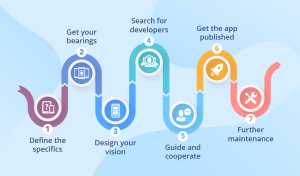In the evolving world of web development the MERN stack (MongoDB, Express.js, React and Node.js) has become extremely popular for building dynamic web applications. However regardless of your expertise in MERN development encountering bugs and errors is inevitable. This is where effective testing and debugging strategies come into play.
In this guide, we will explore strategies that MERN Stack developers can use to improve their testing and debugging skills ensuring the delivery of high quality applications. Whether you are a developer or looking to hire a MERN stack developer, these strategies are crucial for maintaining an dependable codebase.
The Significance of Testing and Debugging
Testing and debugging are components throughout the software development life cycle. They play a role in the following areas;
- Error Detection; Testing helps identify and resolve errors to ensure that your application functions as intended.
- Code Quality; Effective testing and debugging contribute to maintainable code making it easier for developers to collaborate on and maintain projects.
- User Experience; A tested application, without bugs provides an reliable user experience that enhances user satisfaction.
- Cost Savings; Detecting and resolving issues, in the development process can save time and resources. The cost of fixing a bug tends to increase as it progresses through the stages of development.
Effective Testing Strategies
1. Unit Testing
Focus on Individual Components; Unit testing involves checking the functionality of functions or methods. It is important to ensure that each unit of your code works correctly when tested in isolation.
Utilize Testing Frameworks; Utilizing testing frameworks like Jest for React components or Mocha for Node.js backends simplifies the process of writing and executing unit tests.
2. Integration Testing
Test Component Interaction; Integration tests evaluate how components within your MERN application interact with one another. It is crucial to verify that data flows correctly between these components.
API Integration; When working with MERN applications it is vital to test API endpoints. How the frontend communicates with the backend. Tools such as Supertest can be helpful in this regard.
3. End to End (E2E) Testing
Simulate Real User Scenarios; E2E testing assesses your applications functionality from a users perspective. Tools like Cypress or Puppeteer simulate user interactions, such as clicks and form submissions.
Validate User Journeys; It is important to ensure that common user journeys, such, as signing up logging in or making a purchase work seamlessly.
4. Regression Testing
Automating Tests; Create a set of regression tests that run automatically whenever there is a code change. This ensures that new code doesn’t cause any issues, with existing functionality.
Integration with Version Control; Connect the regression tests to your version control system, such as Git so that they can be executed before merging any code.
Debugging Strategies
1. Utilize Debugging Tools
Browser Developer Tools; When working with React applications the browser developer tools are extremely helpful for examining and troubleshooting components and their current state.
Node.js Debugging; For debugging server side in Node.js you can leverage the built in debugger or tools like node inspect to set breakpoints and analyze variables.
2. Logging and Error Tracking
Implementing Comprehensive Logging; Make use of logging libraries like Winston for Node.js to record information, including errors and events occurring within your application.
Error Tracking Services; Implement error tracking services like Sentry or Bugsnag to automatically identify and report any errors within your application.
3. Code Reviews
Collaborative Debugging; Conduct code reviews, with developers to gain fresh perspectives and catch any issues that may have been overlooked.
Enforcing Coding Standards; During code reviews enforce coding standards to maintain consistency in the codebase and identify sources of bugs.
Benefits of Effective Testing and Debugging
The advantages of testing and debugging are numerous, for MERN Stack developers and their projects:
1. Improved Code Quality; Thorough testing and debugging lead to more dependable code reducing the likelihood of errors.
2. Swift Issue Resolution; Identifying and resolving issues on during development saves both time and resources.
3. Enhanced Collaboration; Having a testing process and a clear codebase facilitates collaboration among developers working on the project.
4. Increased User Satisfaction; A bug free application ensures an user experience resulting in satisfaction levels.
Conclusion
In conclusion, testing and debugging play a role in the success of MERN Stack development projects. Whether you’re a MERN Stack developer or planning to hire one these strategies are vital for creating quality and reliable applications.
By implementing testing strategies and embracing debugging practices from the initial stages of development you can ensure that your MERN applications are not only functional but also easy to maintain while being free, from bugs. Prioritizing testing and debugging will save you time, resources and headaches in the term.





